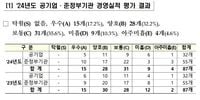On June 20, 2025, South Korea's Ministry of Economy and Finance convened the 6th Public Institution Management Committee meeting to review and approve the results of the 2024 Public Institution Management Performance Evaluation and discuss subsequent measures. This annual evaluation scrutinizes the management performance of 87 public enterprises and quasi-governmental organizations, encompassing 32 public enterprises and 55 quasi-governmental institutions, maintaining the same scope as the previous year.
The evaluation process, finalized by guidelines set at the end of 2023, balances operational efficiency—including financial performance and productivity—with public responsibility, such as fulfilling social obligations. Additional points were awarded to institutions that actively supported government policies aimed at price and housing stability, as well as investment expansion.
Yet, for the third consecutive year, no institution achieved the highest "Excellent (S)" grade. The absence of S-grade performers underscores ongoing challenges in public sector management, despite government efforts to incentivize excellence.
Among the 87 institutions evaluated, 15 (17.2%) earned an "Outstanding (A)" grade, with 5 being public enterprises and 10 quasi-governmental organizations. The "Good (B)" category included 28 institutions (32.2%), split between 11 public enterprises and 17 quasi-governmental bodies. Meanwhile, 31 institutions (35.6%) were rated "Average (C)," comprising 9 public enterprises and 22 quasi-governmental organizations.
Institutions rated "C" or higher are eligible for performance bonuses, distributed differentially according to institution type and grade, rewarding both leadership and staff. This approach aims to foster accountability and motivate continued improvement.
However, 13 institutions (approximately 15% of the total) received unsatisfactory marks—9 institutions (10.3%) graded "Unsatisfactory (D)" and 4 (4.6%) deemed "Very Unsatisfactory (E)." Notably, the number of "D" grade institutions decreased markedly from 19 last year to 9 this year, signaling some progress in management standards. Conversely, the count of "E" grade institutions doubled from 2 to 4, raising concerns about worsening performance in select agencies.
The Ministry of Economy and Finance has outlined firm follow-up actions for these underperforming bodies. Institutions with "D" or "E" overall grades will face scrutiny including potential budget cuts in the next fiscal year. They must also submit comprehensive management improvement plans and undergo consulting to address deficiencies.
Moreover, the government plans to recommend dismissal of institutional heads under specific conditions: those who received an "E" grade and have been in office for at least six months by the end of 2024, as well as leaders of institutions with consecutive two-year "D" grades who have served one year or more. This policy underscores the government's commitment to enforcing accountability at the highest levels.
Additionally, institutional heads of "D" grade organizations or those where serious accidents occurred will receive official warnings, further emphasizing the importance of responsible governance.
Financial accountability measures are also tightening. Public enterprises with deteriorating financial health, including those posting net losses, will see reductions in executive performance bonuses, reinforcing the link between financial stewardship and leadership rewards.
Highlighting some specific institutions, the Health Insurance Review & Assessment Service achieved an "Outstanding (A)" grade, while the National Health Insurance Service and the Korea Social Security Information Service both earned "Good (B)" grades. Meanwhile, the Korea Veterans Health Service was rated "Average (C)." These evaluations reflect varied performance across critical public service sectors.
The Ministry explained that institutions excelling in major projects, financial management, and active implementation of government policies contributing to price stability and economic revitalization were rewarded with higher grades. Conversely, those with poor performance in key areas received lower grades, reflecting the rigorous and comprehensive nature of the evaluation.
Overall, the 2024 evaluation results paint a mixed picture of South Korea's public institution landscape. While improvements are evident in reducing the number of "D" grade institutions, the rise in "E" grades and the continued absence of "S" grades point to persistent challenges. The government's decisive stance on management accountability, including potential dismissals and financial penalties, signals a drive toward more effective and responsible public sector governance.
As the government moves forward with these follow-up measures, the public and stakeholders will be watching closely to see whether these initiatives translate into tangible improvements in the performance and service delivery of public institutions across the nation.


